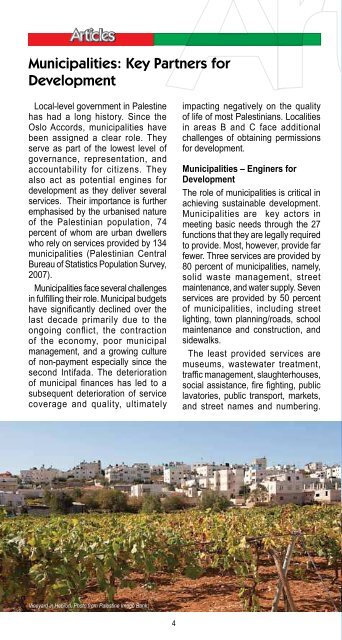Municipalities and Councils - Australians for Palestine
Municipalities and Councils - Australians for Palestine
Municipalities and Councils - Australians for Palestine
Create successful ePaper yourself
Turn your PDF publications into a flip-book with our unique Google optimized e-Paper software.
<strong>Municipalities</strong>: Key Partners <strong>for</strong><br />
Development<br />
Local-level government in <strong>Palestine</strong><br />
has had a long history. Since the<br />
Oslo Accords, municipalities have<br />
been assigned a clear role. They<br />
serve as part of the lowest level of<br />
governance, representation, <strong>and</strong><br />
accountability <strong>for</strong> citizens. They<br />
also act as potential engines <strong>for</strong><br />
development as they deliver several<br />
services. Their importance is further<br />
emphasised by the urbanised nature<br />
of the Palestinian population, 74<br />
percent of whom are urban dwellers<br />
who rely on services provided by 134<br />
municipalities (Palestinian Central<br />
Bureau of Statistics Population Survey,<br />
2007).<br />
<strong>Municipalities</strong> face several challenges<br />
in fulfilling their role. Municipal budgets<br />
have significantly declined over the<br />
last decade primarily due to the<br />
ongoing conflict, the contraction<br />
of the economy, poor municipal<br />
management, <strong>and</strong> a growing culture<br />
of non-payment especially since the<br />
second Intifada. The deterioration<br />
of municipal finances has led to a<br />
subsequent deterioration of service<br />
coverage <strong>and</strong> quality, ultimately<br />
4<br />
impacting negatively on the quality<br />
of life of most Palestinians. Localities<br />
in areas B <strong>and</strong> C face additional<br />
challenges of obtaining permissions<br />
<strong>for</strong> development.<br />
<strong>Municipalities</strong> – Enginers <strong>for</strong><br />
Development<br />
The role of municipalities is critical in<br />
achieving sustainable development.<br />
<strong>Municipalities</strong> are key actors in<br />
meeting basic needs through the 27<br />
functions that they are legally required<br />
to provide. Most, however, provide far<br />
fewer. Three services are provided by<br />
80 percent of municipalities, namely,<br />
solid waste management, street<br />
maintenance, <strong>and</strong> water supply. Seven<br />
services are provided by 50 percent<br />
of municipalities, including street<br />
lighting, town planning/roads, school<br />
maintenance <strong>and</strong> construction, <strong>and</strong><br />
sidewalks.<br />
The least provided services are<br />
museums, wastewater treatment,<br />
traffic management, slaughterhouses,<br />
social assistance, fire fighting, public<br />
lavatories, public transport, markets,<br />
<strong>and</strong> street names <strong>and</strong> numbering.<br />
Even in the areas where services are<br />
provided, substantial improvements<br />
are required. (See Box 1.).<br />
Several donors are supporting<br />
investments in infrastructure at the<br />
municipal level. However, sustainable<br />
service delivery requires an improved<br />
municipal fiscal situation. Currently,<br />
average per capita expenditure from<br />
municipalities own budget sources is<br />
only NIS 9 per year. Ninety percent of<br />
the municipal budgets are allocated<br />
<strong>for</strong> recurrent expenditure leaving only<br />
10 percent of the budget <strong>for</strong> capital<br />
investments. The deficits in service<br />
provision also reflect the small size<br />
of Palestinian municipalities: 101<br />
municipalities have populations of<br />
less than 25,000 <strong>and</strong> there<strong>for</strong>e do not<br />
have the economies of scale to provide<br />
several services.<br />
To improve their services, it is<br />
crucial <strong>for</strong> municipalities to look <strong>for</strong><br />
opportunities <strong>for</strong> revenue collection.<br />
Municipal amalgamation also requires<br />
increased attention.<br />
Governance, Representation, <strong>and</strong><br />
Accountability<br />
Elections are a key element to ensuring<br />
municipal accountability – <strong>and</strong> should<br />
be supported. But accountability<br />
goes far beyond just elections.<br />
Vineyard in Hebron. Photo from <strong>Palestine</strong> Image Bank. Construction of a new road in Hebron. Photo from World Bank Archive.<br />
5<br />
Investments <strong>and</strong> budgets should be<br />
responsive to needs, <strong>and</strong> financial<br />
systems should allow municipalities<br />
to easily determine how its funds are<br />
being used. This would also help cut<br />
corruption <strong>and</strong> foster transparency.<br />
Finally, municipalities should also<br />
look carefully at how they interact with<br />
the public. Palestinian municipalities,<br />
<strong>and</strong> the Palestinian Authority, have<br />
made several interventions to support<br />
governance <strong>and</strong> accountability.<br />
Aligning municipal investments with<br />
needs. Several municipalities are<br />
undertaking Strategic Development<br />
<strong>and</strong> Investment Plans (SDIPs) to<br />
assist them in identifying priorities/<br />
needs <strong>and</strong> aligning their identified<br />
investments with such priorities.<br />
Community participation is integrated<br />
into the strategic planning process<br />
to ensure that community needs<br />
Box 1: Some Facts on Service<br />
Levels<br />
• 26 percent of water supply network<br />
is in need of maintenance<br />
• 52 percent of municipal roads are<br />
unpaved <strong>and</strong> maintenance varies<br />
widely<br />
• <strong>Municipalities</strong> have only 46 percent<br />
of equipment needed,<br />
• <strong>Municipalities</strong> have 82 percent<br />
of classrooms needed, but<br />
maintenance varies widely



